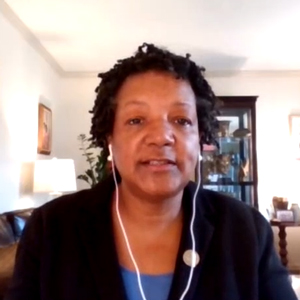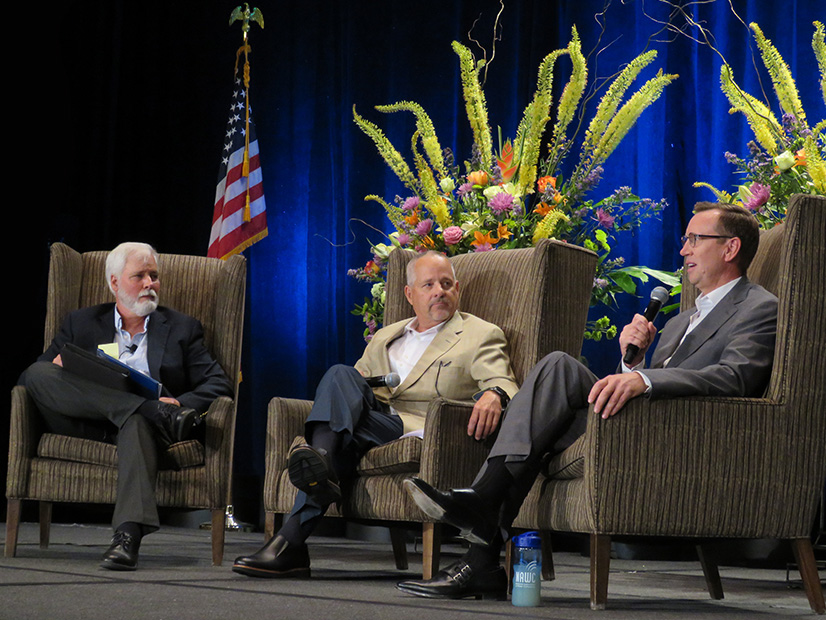Utility operators and regulators are increasingly confident in the ability of their industry to coordinate in response to major catastrophes, participants told the National Association of Regulatory Utility Commissioners’ Summer Policy Summit on Monday.
“Our situational awareness today is light-years more than it was just a few years ago,” Stefan Bird, CEO of Pacific Power, said at a panel titled “Black Sky: Are We Ready?”
“And that information that we have, we’re increasingly sharing on our website, with our customers, with our regulators, and how we interact in technology is giving us all some very exciting new pathways.”
The panel focused on the response of utilities to “black sky” events, defined by NARUC President and panel moderator Paul Kjellander as “a multiregional catastrophic event that affects multiple critical infrastructure sectors for an extended period of time.”
2017’s Hurricane Maria was mentioned repeatedly as a prominent example of such an event because of the devastation it wrought on multiple islands in the Caribbean — particularly in Puerto Rico, which suffered a monthslong electric blackout. Other examples include February’s winter storms in the Midwest, which led to the near collapse of the power grid in Texas. (See ERCOT: Grid was ‘Seconds and Minutes’ from Total Collapse.)
The mass outages in Texas illustrated the “interdependencies of the utility sector,” said David Anderson, CEO of NW Natural. This theme has been touched on by many observers since the crisis, including NERC CEO Jim Robb — who pointed out in a congressional hearing in March that many gas pipelines in Texas exhibited weather-related difficulties in February as well. (See Senators Grill Robb, Asthana over Texas Outages.)
However, this interdependency may have a silver lining in the sense that utilities, more aware than ever that failures in one industry could ripple across the critical infrastructure sector, have greater incentive to work together and help one another restore service. Anderson and Bird both observed that the 2018 explosion of a gas pipeline in British Columbia prompted an immediate response by electric and gas companies in the region, constituting a “core coordination effort amongst all of us,” as Anderson put it.
Regulators Essential to Response

Regulators have a major role to play in the response to black sky events as well, serving as a neutral third party that can coordinate utilities across industries, regions and even jurisdictions: Anderson praised public utility commissioners for helping prod a recalcitrant Canadian utility into providing crucial information to its peers. Gladys Brown Dutrieuille, chair of the Pennsylvania Public Utility Commission, said the usefulness of PUCs in this job has become increasingly clear to utilities.
“In Pennsylvania, when we do have a big event where we need to bring in all the utilities, our list includes those that we don’t even regulate, because they want to be part of the discussion,” Dutrieuille said. “During those calls we’re talking to the CEOs and the presidents and whatever technical members that they need … and we also include our elected officials. … Everyone wants to be on the call to discuss what it is that we can do, or what they need in certain areas, and discuss all those different things that come along with it.”
This increased willingness to work together with peers and regulators comes at an important time, as panelists noted that changing climate conditions are likely to bring ever more extreme weather events to bear around the world, while a polarized political atmosphere creates its own challenges to cooperation. Utility managers will have to learn to step out of their comfort zones and find help wherever they can.
“Whether it’s Tokyo [or] New Zealand, there’s all sorts of examples around the world that these black swan events are, at least, events that we should all learn from and say, ‘Did I get that right and how do I prepare?’” Anderson said. “I know, at least in our jurisdictions, I can pick up the phone [and] I have no worry that it’s going to be taken out of context, or it’s going to go public when it doesn’t need to go public. I can say, ‘This is the problem I’ve got — how can you help me, and how can I help you?’”


